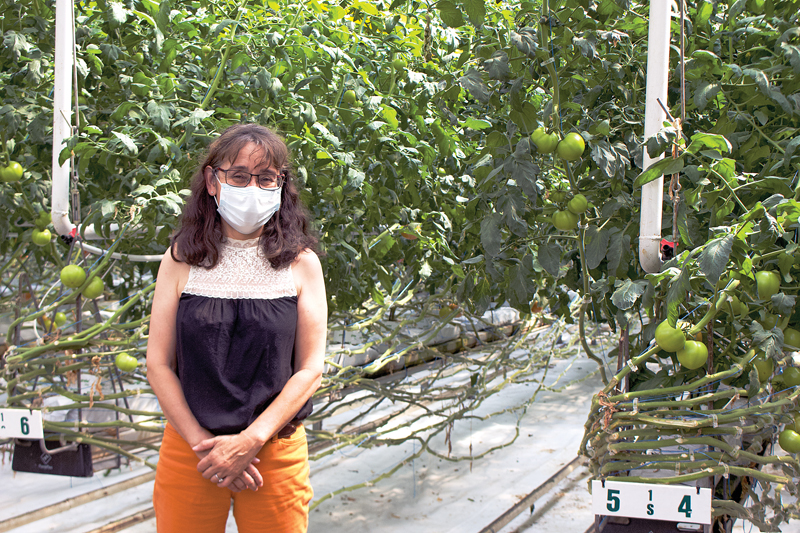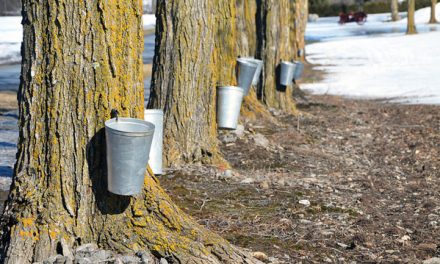Carmen Mitchell, co-owner of SunTech Greenhouses Ltd in Manotick stands amongst the rows of tomoatoes. The foreign workers are hired to look after these plants from planting, pruning and harvesting.
By Tricia Surette
AgriNews Contributor
MANOTICK – Covid-19 has highlighted many challenges in the farming industry including mental health issues and high debt loads. One of the more contentious issues is foreign workers.
The Seasonal Agricultural Workers Program (SAWP) has been bringing foreign workers in from Mexico or participating Caribbean countries for 54 years. For farmers, foreign workers are a valuable asset to their operations. Without them, crops would rot in the fields and operations would grind to a halt.
When Covid-19 shut everything down in March, the government closed the borders and initially decided that all foreign workers had to stay home. That decision was quickly reversed, but new rules were implemented including a 14-day quarantine upon arrival, as well as new rules for retrofitting existing bunk houses to meet social distancing guidelines.
Dean Beckstead of Smyth’s Orchards in Dundela, Ontario, had to make extensive changes to his bunk house to meet the new rules.
“With the new rules and regulations that Service Canada brings in,” said Beckstead, “we’ve always been okayed for 17 workers for our bedding, our sinks and toilets and showers but now, the new rules and regulations – can’t use bunk beds, then we had plywood dividers down the center between the beds and now that doesn’t fly anymore. One man per bed, bed has to be 6 feet a part. The extra regulations have cost us a pile of money. Money out of our pockets.”
On July 31, 2020, the government pledged an additional 58.6 million dollars to help farmers with the extra costs associated with the new regulations. Farmers can receive up to $1,500 per foreign worker to cover the costs of paying them while quarantined and the costs of upgrading living accommodations to meet the new social distancing requirements.
Despite all the effort farmers have put in to care for their workers and meet all the new Covid-19 regulations, there is still a lot of negative press and misunderstanding around the use of foreign workers on farms. Unfortunately, a few bad situations in southern Ontario has not helped improve the perceptions of the general public.
“You get the one incident in Ontario,” said Beckstead, “and they bring in more rules and regulations because of one situation. Where was he keeping the distance and keeping the locals and workers apart?”
Wade into the comment section of almost any article on the subject, especially on major news sites, and the comments include everything from “just hire local” to ‘farmers are taking advantage of these workers’, and ‘end foreign worker programs, they are tantamount to slavery’.
It is also not unusual for people to be completely disconnected from where the food in their grocery stores comes from or how it gets there.
“When all this Covid stuff started, people were mad that they were going to let off-shore labour come back into the country,” said Beckstead. “Some lady posted on Facebook, ‘well it doesn’t matter if they come in or not, we just go to the grocery store to buy our food.’”
Foreign farm workers are some of the most protected workers in Canada, according to Ken Forth, chair of the labour section of the Ontario Fruit and Vegetable Growers’ Association and a broccoli farmer in Hamilton. As long as the foreign workers are working, they have full health benefits and workers compensation benefits. They are covered from the time they board the plane until they safely return home.
As part of the process of bringing in foreign workers, farmers have to show they’ve advertised locally first to fill the jobs but hiring local is another challenge farmers face and it has gotten worse with each passing season.
Canadians do not want to work 50 hours a week, rain or shine, harvesting produce for minimum wage. And those that do show up, rarely last.
“[Local workers] normally don’t last,” said Bob Mitchell, owner of SunTech Greenhouses Ltd. “We have tried during this current time and we got a bunch that came. The one that lasted the least, lasted two hours.”
Most foreign workers are treated quite well and many return year after year to the same farm, developing good relationships with their farm families and their communities.
Sara Mohedano Gomez has been coming to Canada to work for 13 years. She currently works at Suntech Greenhouses Ltd. in Manotick and this is her second year working there. In the past, she has worked on many different kinds of farms including peach, pears, grapes, apricots and plums.
Her experience with local workers is that they are “no good”. Canadians don’t want to put in the long hours necessary to harvest crops, often with short windows for maximum freshness and quality. When their shift is done, they leave whether the job is completed or not. And most frustratingly for Gomez and her fellow foreign workers, if Canadians didn’t like a job, they would leave it for “the Mexicans” to do.
While being away from home is hard, the money they make provides stability, healthcare and upward mobility for their families.
“They are the rich people in their country,” said Mitchell, when talking about a trip to Mexico three years ago where he visited some of his workers.
Gomez first started coming to work in Canada because her daughter was born with a hip condition that required surgery, braces and other medical interventions. Without the ability to come to Canada to work on the farms, Gomez would not have the money to pay for her daughter’s care.
Now, her money pays for her mother’s diabetes care.
Gomez has also been able to buy herself a plot of land on which she hopes to build a house. She currently has 2000 bricks with which to start building, and when completed she hopes to have a small store attached to her house where she will run a stationary business for the areas school children.
Gomez is an avid cyclist and she takes her bike and goes for long rides around Manotick. In her adventures, she has met many people and struck up many conversations despite her limited English. One day she biked as far as the local church and a family she met there insisted on putting her bike in the back of their vehicle and driving her home with a jar of homemade apple preserves pressed into her hands.
She has also been invited for Thanksgiving dinner.
Unfortunately, Covid-19 has kept most foreign workers confined to their farms and many are missing the opportunity to socialize within their adopted communities.
Alejandro Hernandez-Hernandez also works at SunTech Greenhouses Ltd. This is his second year. In early August his wife gave birth to their first child, a son, and he is anxious to return home in October to meet him but the money he makes working in Canada will help him buy a house and start a cattle business.
While missing Mexico and their families is hard, they have adapted. According to Carmen Mitchell, co-owner of SunTech Greenhouses Ltd., the wives are often impatient for their husbands to leave.
For Canadian farms to continue functioning foreign workers are a necessity. Covid-19 has placed some added stress on the whole food system and highlighted Canada’s dependency on these workers for better or for worse. At many farms though, they are treated like family and looked after very well.













